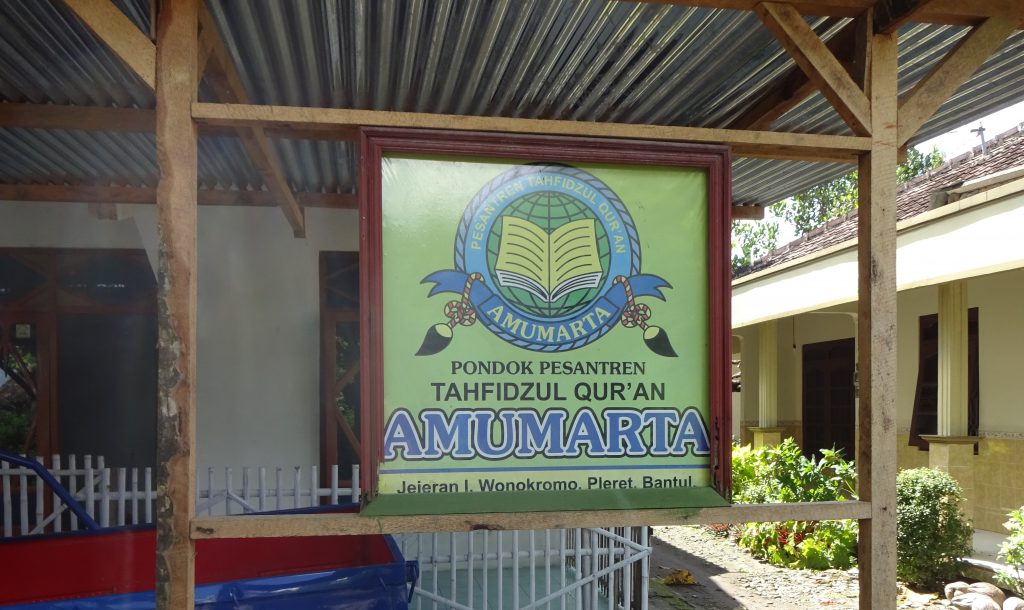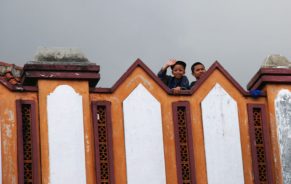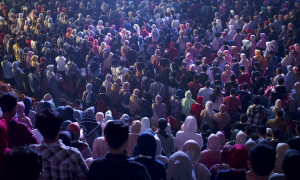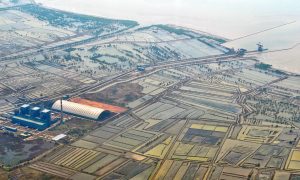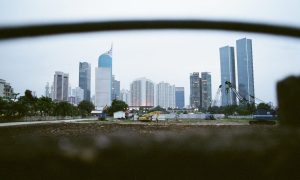In the last few years, environmental awareness amongst Muslim authorities and Islamic organisations in Indonesia has been rising. They increasingly recognise and articulate an Islamic environmental ethic and actively seek to mitigate environmental problems such as climate change, pollution, degradation or natural disasters. In their environmental efforts to counter socio-ecological degradation and global warming, Islamic scholars have developed an ethical commitment based on the Qur’an and the Hadiths in order to protect the enviroment and act more sustainably.
Permaculture on Islamic principles: The socio-ecological project Bumi Langit
In 2006, Iskandar Waworuntu founded the Bumi Langit permaculture farm in Imogiri near Yogyakarta, Indonesia, where about ten people live and work. They produce food by practicing permaculture, thus enhancing the biodiversity in that region, and provide courses on sustainable agriculture. Bumi Langit also supports and integrates villagers living nearby by providing jobs and occasionally free food. While this socio-ecological project is rather small in scale, it received national and international publicity due to its vigorous co-operation with a wide range of well-known civil society organizations, activists and universities.
Sufism and eco-mysticism: Humans as khalifa and the rejection of excessiveness and ‘Western modernism’
Iskandar Waworuntu converted to Islam in 2000 because Sufism and especially texts by Jalal al-Din Rumi (1207–1273), a well known Sufi mystic and poet, attracted him.
According to Sufi tradition, the universe is a divine revelation and everything is created by God (makhluk). Allah gave everything a specific function and thus it is humanity’s duty to guard the Earth and every creature as its khalifah (custodian). Consequently, according to Iskandar Waworuntu, harming the Earth is sinful. Every person, and especially Muslims, are obligated according to their Islamic environmental ethic to protect the divine creation.

Photo courtest of Bumi Langit
According to Iskandar Waworuntu, Allah created everything in pairs and seeks balance between them, sparking a perpetual struggle for equilibrium. Thus, as the inverse balancing force for humans, Allah created also the Jinn —supernatural creatures made of smokeless fire—which inhabite the Earth alongside humans and angels (malayka). Some Jinn are evil, such as Lucifer, and are able to infiltrate the human body in order to influence and tempt humans. According to Iskandar, the predominant temptation and trial (fitna) today is the unbalanced relation of humans and the environment, because “the earth has never suffered so much before”. Thus, misguided humans driven by ignorance and excess follow the path of money, live in seclusion from the environment and exploit nature. In regards to fossil fuels, he argues that it is not prohibited to extract oil and coal per se. This must be done, however, in reasonable amounts. “If humans are excessive, they are side by side with the devil”, he explained. Excessiveness is also connected to pollution as, in oppressing the Earth, humans also pollute their bodies and minds.
For Iskandar, Bumi Langit is both a way out of an excessive, ignorant and polluted life as well as an opportunity to practice the Islamic ethical commitment to sustainability and environmental protection. Accordingly, the objectives of Bumi Langit are to “help establish civil society through training and education, awqaf, zakah, infaq and shodaqoh collection in relation to the development of a Sunnatullah living.”. Sunatullah, the law or the course of Allah, is therefore connected to the concept of sustainability. The guiding principles of Bumi Langit are: Islamic tawhid (oneness); khalifah (custodianship); justice to nature and the environment; pure, halal and thoyyib (wholesome); openness and diversity, Asah-Asih-Asuh (teach-love-care), and teamwork to realise independence. More concretely, permaculture is seen as “a behavioural concept in actualising God’s blessing for all the universe (rahmatil alamin)”.
The cosmological and religious approach of Bumi Langit shows similarities to other Islamic scholars who advocate for environmental protection through reference to the Qur’an and the Hadiths. Such scholars argue that humans, in their unique position of the khalifah, should disapprove of the excessive consumption of natural resources. Additionally, Islamic environmentalists tend to adhere to Sufism and eco-mysticism and therefore reject “Western modernism”, viewing capitalism and secularism as the sources of environmental problems and emphasising spirituality as a key principle in adressing environmental problems.
Renewable energy inspired by the Qur’an
Muhammad Djawis Masruri, the leader (kyai) of the Amumarta Islamic boarding school in Yogyakarta, plans to expand the production of biofuel derived from the fruits of the native nyamplung tree (Calophyllum inophyllum). This locally-produced oil, made from renewable natural resources, could contribute to a future phasing-out of fossil fuels.
Djawis states that his motivation to develop renewable energy in Indonesia came from the Qur’an. He was inspired by verse 80 of surah 36 of the Qur’an which mentions a green tree from which fire can be made. Djawis considered the content of the sura in the Indonesian context and started thinking about a similar tree. He remembered childhood stories about the fruits of the nyamplung tree from which lamp oil was extracted. People extracted oil from the fruits, filled the oil in small bamboo tubes, added a wick and lit it.
Until recently, hundreds of cooperating villages in the district of Bantul in the south of Yogyakarta produced 100,000 litres of nyamplung oil per month and sold the fuel to a nearby manufacturing company. However, the contract with the manufacturing company ended in 2010, as the nyamplung biofuel was too expensive in comparison with highly subsidised fossil fuel.
Djawis is interested both in extracting and marketing the biofuel but also in his project’s potential to improve the socio-ecological environment of these villages. The nyamplung trees develop strong and deep roots, reducing soil erosion. Furthermore, the trees and their soil hold moisture and benefit the water table—a crucial advantage in the dry region of Bantul. Consequently, the trees contribute to sustaining villagers’ livelihoods by enhancing both their economic conditions and the region’s microclimate. Djawis argues that locals need clear incentives to stop logging trees and selling the wood by stating: “If people can profit from living trees, they will protect them.”
Investors and government still profit from fossil energy
In order to replace fossil fuels in the future, nyamplung oil production would have to be scaled up drastically. The main problem, however, is marketing, as Djawis explains: “nyamplung oil cannot compete on the domestic market because the state is subsidising only fossil fuel and not biofuel.” Thus Djawis, with the support of pupils and alumni of his Islamic boarding school, developed a business plan for expanding the production of the biofuel in order to find investors and convince the government to provide subsidies. Djawis and his team showed that the nyamplung trees could be planted in a mixed cropping in quantities of up to 1,000 hectare. The technology they developed for purifying the oil is highly effective and Djawis considers it to surpass the processes designed by other companies and universities in Indonesia. However, negotiations with investors and the government have been unsucessfu, with representatives showing interest but offering unacceptable conditions.
Although Presidential Decree 26/2006 set a target of increasing renewable energy up to 17% of the total energy mix, the Indonesian government continues to support the extraction and use of fossil fuels. Indonesia is the second-largest coal producer globally and the largest exporter of thermal coal. Coal mining is inextricably tied to the national agenda of development and is expected to further economic and social advancement as well as safeguard the country’s energy supply. Thus, both national and local governments are reluctant to support local initiatives for producing renewable energy. To explain state actors’ low engagement in enforcing Presidential Decree 26/2006, Djawis points to the influence of the fossil fuel industry over Indonesian politicians. “Many of the members of parliament have shares in the coal and oil industry, thus they don’t want to lower their profit and stick to fossil energy.”
Environmental protection only in accordance with the state’s agenda
The Pesantren Amumarta is affiliated with Nahdlatul Ulama (NU), the largest of Indonesia’s two major Islamic organisations (followed by Muhammadiyah). Whereas both Islamic organisations have dealt with environmental issues since their foundation, the 1980s saw Islamic boarding schools (pesantren) beginning to directly address environmental degradation. In the 2000s, both organisations established departments for dealing with deforestation, disasters and the impacts of climate change. Both organisations also lobby for environmental protection on the political level. In 2007, the NU’s National Movement for Forestry and the Environment (GNKL) admonished the government for action against environmental degradation. Both organisations seek to raise ecological awareness and mobilise communities to engage in environmental protection through teachings in mosques and Islamic teaching forums (pengajian), calls for an eco-jihad and the implementation of programmes for reforestation and environmental conservation.
Jokowi and NU: the view from the pesantren
Islamic boarding schools are ground zero for Jokowi’s efforts to win over the Muslim grassroots. Ideology and patronage are both playing a part.
In the 2010s, the government and Islamic organizations established dozens of so called eco-pesantren in order to adress environmental destruction. In the wake of global discourses on climate change mitigation, ministries and local governments aimed to raise awareness of environmental problems amongst local communitie. To do so, they approached local religious leaders of Islamic mass organisations, drawing on their broad networks of Islamic boarding schools and influential position in society to disseminate information and implement projects. As ties between Nahdlatul Ulama (NU) and government institutions are strong, Muslim scholars collaborated with governement officials to develop Islamic eco-theology and implemented programmes such as waste management and organic farming.
Interestingly, a considerable number of pesantren educate pupils not only in carrying out environmental practices according to Islamic theology, but also in developing entrepreneurial skills. Thus, by participating in eco-friendly programmes, pupils can learn practical skills and increase their environmental entrepreneurship, which in turn also increases the profitability of the institution.
When asked if his pesantren is also an eco-pesantren—thus a ‘green pesantren’ (pesantren hijau), formally supported by ministries and the local governement—he vehemently denied. He explained that no ‘green’ pesantren exist in Indonesia, only ‘red’ and ‘white’ ones. ‘Red’ ones orient their teaching agenda towards the government and support the president. ‘White’ ones, such as his pesantren, are independent from government curricula and are not involved in political issues. For such ‘white’ pesantren, he explained, it could be difficult to maintain their activities and teachings due to a lack of financial support and formal acknowledgment of qualifications by the government and state institutions.
Thus, one reason for the difficulties Djawis experienced in the marketing of nyamplung oil could be his weaker relationship with the local and national political elite. Furthermore, his aim to produce renewable energy undermines the prevailing state development objectives which endorse fossil fuels. His approach to address environmental issues was not developed in cooperation with governmental institutions, unlike the aforementioned program to establish eco-pesantren, and challenges instead the state’s energy policies.
Little impact in Kalimantan: The ‘eye of the storm’
The promotion of ecological awareness through Islamic mass organisations has found its greatest reach on the island of Java. One barrier to the large-scale implementation of environmental projects by the NU and Muhammadiya is the limited dissemination of knowledge to the larger community, as well as rural religious scholars’ lack of education about climate and environmental change and a perceived sense of elitism in campaigns on climate change. These Islamic environmentalist programs have failed to take hold in areas such as Kalimantan and Sumatra, even though they suffer more dramatic effects of environmental destruction. Kalimantan is the ‘eye of the storm’ of coal extraction and the ever-growing palm oil plantations. Due to land conversion, many of its residents are currently experiencing drastic changes in their livelihoods and struggling with conflicts about land access and distribution of returns from the exploited resources. As the majority of Kalimantan’s population is Muslim, there would be ample potential for Muslim scholars and representatives of Islamic institutions to advocate for environmental preservation. This, however, is not currently the case. In 2006, the Indonesia Ulama Council (MUI) in South Kalimantan issued several fatwas for environmental protection, speaking out against excessive logging, illegal mining and burning of forested land to expand plantations. The MUI thereby pronounced that environmental destruction is haram and encouraged the provincial government to annul a mining licence the Ministry of Energy had issued in the Meratus mountains. In 2012, however, representatives of the MUI in South Kalimantan criticised the difficulties of implementing the fatwa and its lack of effectiveness. The MUI initiated meetings with representatives from the extractive industries and the government in order to discuss environmental problems. However, the companies and the state only sent deputies who had no decision-making power.
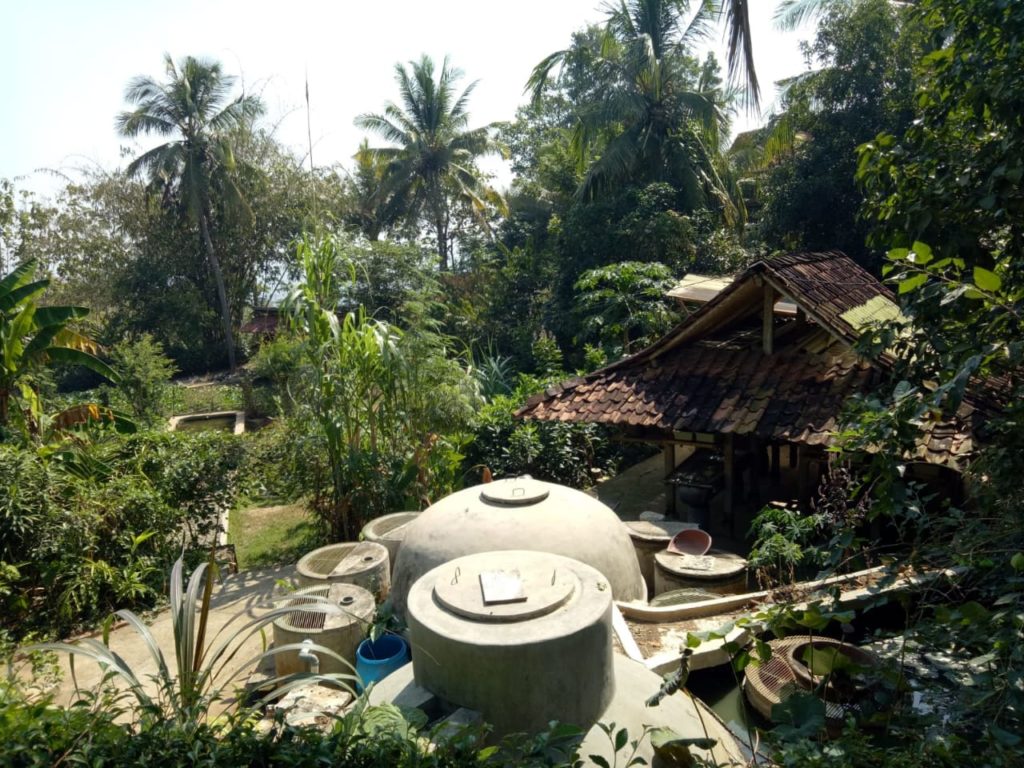
Photo courtesy of Bumi Langit
Much like the difficulties experienced by the MUI in South Kalimantan, Djawis also did not get support from the state and companies for his agenda of environmental protection based on Islamic principles. This brand of Islamic environmentalism challenges the state’s development platform, which is predicated on the extraction of natural resources and fossil fuels. In light of the lack of corporate or state support, Djawis’ success in establishing Bumi Langit is particularly notable. As a small-scale socio-ecological project, motivated by an Islamic ethical commitment linked to the Qur’an and the Hadiths, it has educated and supported villagers in Bantul and improved their economic situation writ large. As a locally-integrated religious and social-ecological project, Bumi Langit has also established a space where its members practice sustainability, informed by the duty of all Muslims to protect the environment.
These examples show that elements of the Islamic canon offer references for the development of an eco-theology that inspires Muslims to actively engage in environmental protection. Inspired by this interpretation, small-scale Islamic socio-ecological projects have been successful in enhancing biodiversity and sustaining the livelihood of villagers. Nevertheless, when it comes to challenging the state’s agenda of development based on resource extraction and fossil fuels, ‘green Islam’ is still a toothless tiger.
 Facebook
Facebook  Twitter
Twitter  Soundcloud
Soundcloud  Youtube
Youtube  Rss
Rss 